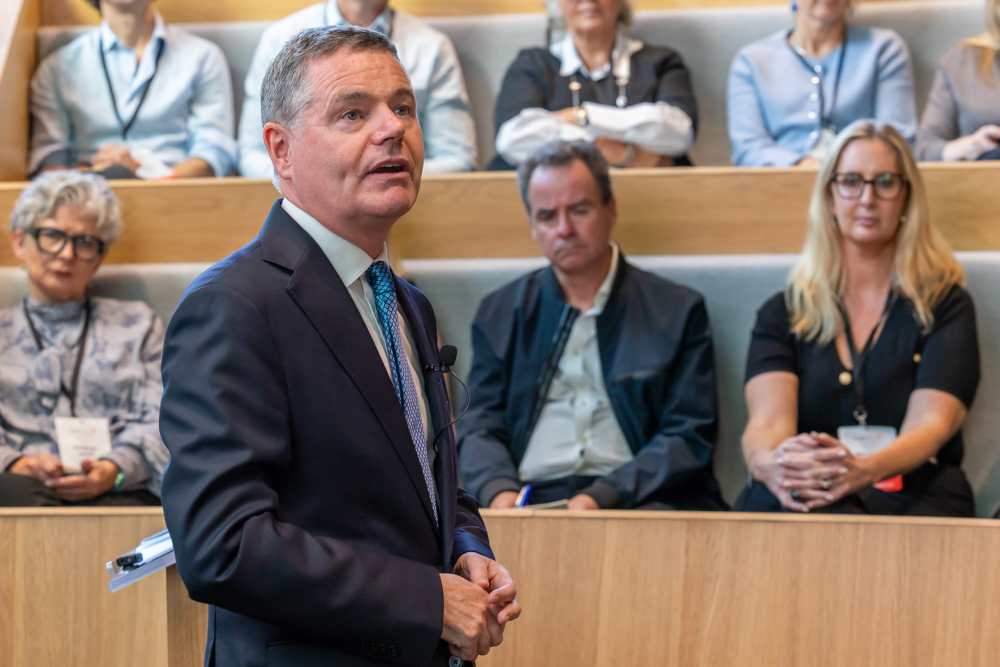Ireland unveils €9.4bn budget focused on housing and wage reform – Government confirms minimum wage rise and VAT cuts for apartments amid tight fiscal constraints.
The Irish Government today (7 October 2025) unveiled Budget 2026, a €9.4bn package that prioritises housing investment and confirms a national minimum wage increase to €14.15 per hour, as the country seeks to balance economic prudence with social support.
Finance Minister Paschal Donohoe, TD, described the Budget as “sensible,” aimed at protecting jobs and building on recent progress. The Government resisted calls for sweeping tax cuts despite record income tax receipts projected to exceed €39bn and corporation tax revenues forecast at €34.1bn.
“Our economy is fundamentally resilient. We have made huge progress in successive governments to return our public finances to health, and we are in a strong position to confront the challenges ahead”
“The Government’s objective is to enhance living standards, support business and improve overall wellbeing for the entire country,” Donohoe said ahead of the budget’s formal presentation to the Oireachtas. The package includes €1.5bn in tax measures and €7.9bn in expenditure.
The Finance Minister acknowledged the impact of recent trade tensions, particularly the imposition of 15% tariffs on EU imports by the United States. “Free and rules-based trade has been a pillar of the Irish economy for many decades,” he said. “The disruption to internationally settled trade rules will damage Ireland’s economic growth.”
Despite these challenges, Ireland’s economy remains resilient, with employment at record levels of 2.8m and unemployment at 4.6%. Modified domestic demand rose 3.8% in 2025, and GDP growth is forecast at 2.3% for 2026.
Housing and infrastructure investment
The Budget allocates €5bn to housing delivery, including a VAT cut from 13.5% to 9% on new-build apartments. This measure targets up to 40,000 units with existing planning permission and forms part of a broader €36bn housing investment programme under the National Development Plan to 2035.
Capital investment totals €19.1bn, with key allocations including €3.43bn for transport infrastructure, €12bn for water services, and €9.2bn for health capacity expansion. The Government aims to deliver 25,000 new homes in 2026, including 10,200 social units.
Business impact and wage pressures
The 65 cent minimum wage increase, recommended by the Low Pay Commission, has drawn concern from business groups.
The Irish Small and Medium Enterprises Association described the increase as “unsustainable,” citing risks to viability and employment levels.
Fórsa, Ireland’s largest public sector union, said the absence of income tax reliefs would likely fuel wage demands across sectors, with implications for public pay negotiations in 2026.
The hospitality sector will benefit from a VAT reduction to 9% effective July 2026, costing the Exchequer an estimated €232m. However, while warmly welcoming the VAT reduction, business group the Restaurant Association of Ireland has criticised the decision to increase the minimum wage and warned of looming cost burdens for the sector.
The budget also includes enhancements to the Research and Development tax credit and expanded eligibility for the Digital Game Tax Credit.
Enterprise support measures
The Department of Enterprise, Tourism and Employment receives €1.3bn, with reforms including establishment of a Small Business Unit and Cost of Business Advisory Forum.
The Government will launch Start-up Ireland and a National Enterprise Hub to streamline access to grants, alongside promotion of AI adoption across agencies.
Fiscal sustainability focus
Donohoe addressed Ireland’s reliance on foreign direct investment and corporate tax concentration. “Ten companies account for well over half of all corporate tax receipts,” he said. “A negative shock to these companies would also negatively impact VAT and income tax revenues.”
To mitigate this risk, the Government, he said, will continue building strategic reserves through the Future Ireland Fund and Infrastructure, Climate and Nature Fund, targeting €16bn by end-2025.
“We are building up these funds to set aside some of the more transient revenues instead of using the money to fund current spending,” the minister said.
The Budget maintains a cautious fiscal stance following warnings from the Irish Fiscal Advisory Council and Central Bank about overheating risks. Cost-of-living supports include €400 energy credits for households and extended reduced public transport fares.
“Our economy is fundamentally resilient,” Donohoe concluded. “We have made huge progress in successive governments to return our public finances to health, and we are in a strong position to confront the challenges ahead.”
Budget 2026 actions in summary
Cost Pressures
- Minimum wage increase of 65 cents to €14.15/hour – nearly 5% rise that business groups warn could be “devastating” for margins
- No personal income tax cuts despite record receipts, likely fueling wage demands across sectors
- Carbon tax increases expected, raising fuel and energy costs
Targeted Tax Relief
- VAT cut from 13.5% to 9% on new-build apartments to boost housing supply
- Hospitality VAT reduction effective July 2026 (costing €232 million)
- Enhanced R&D tax credit to support innovation and competitiveness
- Expanded Digital Game Tax Credit with broader eligibility criteria
Business Support Measures
- €1.3 billion for enterprise support including new Small Business Unit and Cost of Business Advisory Forum
- Start-up Ireland initiative and National Enterprise Hub to streamline grant access
- AI adoption promotion across government agencies
- Market diversification funding to help indigenous firms scale
Mixed Economic Outlook
- Stable macroeconomic environment with 2.8 million employed and 4.6% unemployment
- Infrastructure investment of €19.1 billion should benefit construction and related sectors
- Regulatory reforms and planning law changes may create opportunities but also compliance costs
Main image at top: Finance Minister Paschal Donohoe, TD
-
Bank of Ireland is welcoming new customers every day – funding investments, working capital and expansions across multiple sectors. To learn more, click here
-
For support in challenging times, click here
-
Listen to the ThinkBusiness Podcast for business insights and inspiration. All episodes are here. You can also listen to the Podcast on:
-
Spotify
-
SoundCloud
-
Apple




